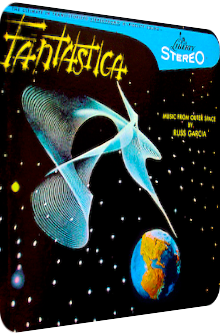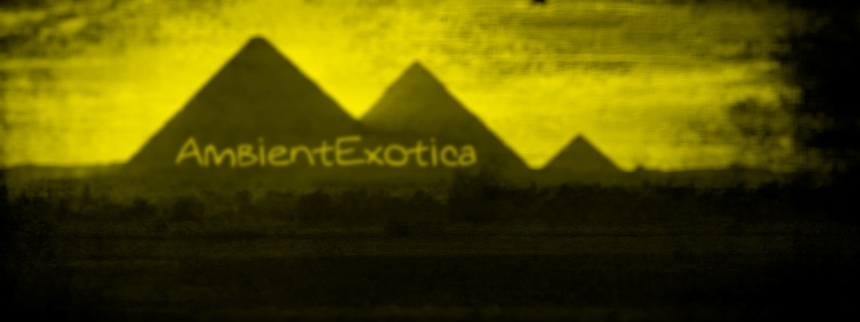
Russ Garcia
Fantastica
1958
Fantastica by conductor, arranger and composer Russ Garcia (1926–2011) is not only a Space-Age artifact, but the genre’s very blueprint, even though Space-Age has existed before its arrival and is too heterogeneous a field to pinpoint anyway. Both its subtitle Music From Outer Space and the front artwork give the definite hint of where this album is situated and gyrating toward: to the pith of danger, or to be more precise, our solar system.
Released in 1958 on Martin Denny’s house label Liberty Records, Fantastica absorbs the alien craze of adventure plots, space travels, B-movies and Roger Corman flicks and pours it into an eclectic mould. And indeed, there were many people back then who believed in highly dangerous anthropomorphous aliens on Mars and elsewhere (maybe even in Tulsa!), so the intrinsic danger of the album met a thankful audience. Space-Age, as multifaceted it may be, is more often than not about delightful entertainment, prosaic moon ditties and string-heavy odes awash with blissful overtones. Then there is the alienating, frequency-widening and -altering approach of artists such as pianists Ferrante & Teicher whose Soundproof (1955) comprises of tweaked pianos, the result being scarily vivid and, well, alienating.
Russ Garcia builds on that very tonality. With the aid of sound designer and engineer Ted Keep, multitudinous ebullient trombones, frosty vibraphones and dramatic flute tones tremble, shudder and flutter into the abyss that is (or was) our solar system. It is this album that laid the foundation for Garcia’s film career. He later went on to compose soundtracks for Atlantis and other adventure movies of that kind, so Fantastica must be terrific. It is. But is much more terrifying. Where other composers glorify the use of technology and the possibility to fly near Saturn’s orbit in order to take part in a birthday party before being warped back to one's bachelor pad on Earth, Garcia superimposes the unknown, the danger that is out there, the possibility of violent encounters. Amid these cloudy thoughts and dark spirits there are wisps of wonder tumbling and flying. There are mirages of goodness, vestiges of glee, reveries of languor. Here is a closer inspection of all twelve tracks.
Into Space, the glorious opener of Fantastica, offers the listener a – back then – remarkable experience: a slick announcer counts down to zero, following by the liftoff of a rocket. The propulsion is powerful, the plasticity of the sound unbelievable and… what? You yawn? Rightly so, for contemporary listeners have encountered this formulaic sequence time and again on hundreds of albums, Space operas and Saturday morning cartoons. But in 1958, Into Space can be considered special. And naturally, the rocket does not stop there. The soothing ambience of the strings and woodwinds, the starlit plinks of the glockenspiel and the helicoidal harp aureoles open up a space for the listening traveler to grasp, making him or her aware of the adventurous journey that lies ahead. Nova (Exploding Star) is the first high watermark: from its frequency-bent circular saw kick-off over partially eldritch Space-Age whirls to cavalcades of shrill fifes and xylophone droplets, space is a mysterious noosphere on Russ Garcia’s album.
Lost Souls Of Saturn surprises with its polyhedric structure, oscillating between aquatic blebs, guiro-underlined Cha Cha Cha veins and abysmal bass protrusions amid its strikingly melodic core, all the while Monsters Of Jupiter widens the field of vision to cinemascope dimensions in a fiery junction supercharged with abrasive brass horror and severe tension. Meanwhile, the materializing Water Creatures Of Astra are not necessarily benign either. Lovecraftian and shapeshifting, their scintillating vesicles are held together by dolorous-shady trumpet serpentines, cosmic airflows, flittering reed riots and twilight reflections. Still alive? Good, for the interim finale Venus spells no doom rather than enchantment. Horticultural harp hazes, soothing string superfluids and glowing glockenspiel globs reunite one more time, but for once, dun-colored euphony evolves, its interstices being covered with cautiously pentatonic scythes and stings. An oneiric dream state.
Red Sand Of Mars opens side B in a curiously dusty fashion. Sure, sand and dust, this pairing fits, but still, it is strange to see the atmosphere shift toward a caravan-esque impression. Snake charmer clarinets, dusky brass fanfares and muffled drums create a feeling of movement and motion in lieu of petrified awe. The Goofy Peepl Of Phobos see Russ Garcia venture into the funnier extraterrestrial parts of our solar system. Finally a moment of comic relief… or so it seems! The xylophone driblets and fairy tale flutes are indeed cheeky and harmless, but the physiognomy of the whole arrangement is severely torn, comprising of rotatory formations and alatoric melodies. Due to this cut anatomy, murkier undertones creep into the scenery, and it is once more not entirely clear whether one can trust these peepl or not. Volcanoes Of Mercury, however, ridicules this question right from the get-go. Who would trust a volcano after all? This place still sports a quasi-enthralling atmosphere, albeit a mephitic one. A female enchantress recurs in-between the staccato timpani stampede time and again. Cinematic horns burst, erupt and explode, downwards-spiraling trombones resemble both the literal and metaphorical downfall of the ashes.
It is Birth Of A Planet that provides an accidental moment of witnessing the morphogenesis of a new star, but instead of joyful elation, plentiful arcana, mysteries and enigmatic tone sequences meet, mesh and depart. Surrounded by cacophonous piano bombs and indecisive clarinet capsules, this is a dangerous affair. The centerpiece Frozen Neptune may be placed in the penultimate position, but its polyvalent structures demand any attention they can fetch: an Ambient piece at its core in hindsight, it is the droning timpani, dark matter trombones and glacial flutes which altogether create an inhospitably inflated granuloma, with the apotheosis Moon Rise seeming almost out of place (or out of the endemic universe) qua its mercilessly amicable and forward-looking tonality. The vibes resemble purity, the flutes are pristine, the strings provide a chromatic backdrop. A delicate endpoint with enough clandestine vestiges to remain portentous.
Fantastica is the uneasiest of all vintage Space-Age affairs, I don’t think I exaggerate in this regard. But speaking of exaggeration: it is true that there are composers who overdramatize the feeling of being entrapped in space, and they do it in great style, be it the likes of György Ligeti and his Lux Æterna suite (1966) or clarinettist Tony Scott whose one-off experiment in Astral Meditation called Voyage Into A Black Hole (1988) augments the pressure chamber effect by worshipping a danger-evoking emptiness. But Fantastica is released quite a few years prior to these examples, and so it can undoubtedly be hailed as the holy grail in all things Space-Age. There is "that guy" called Les Baxter whose Space Escapade (1958) is released in the same year, and granted, it is equally bewitching, but in a different way: Baxter only hints at the turmoil and mayhem that is the concept of space as seen in the 50’s and willfully glorifies and transfigures the vastness via an aural color palette more akin to technicolor than film noir territory. In Russ Garcia’s work, it is the culmination of the admittedly gimmicky frequency elastics, stereo panning ping-pong extravaganza and sound effects, the use of symphonic instruments and the oddly circular blotchiness that altogether grace each of his twelve unique compositions.
That brass layers can sound dangerous, sunset-colored and powerful is no secret. However, when these instruments are placed in-between spacy devices, pernicious strings and sub-zero mallet instruments, their seething nucleus is particularly special. Fantastica is a smash hit and stands the test of time. I conclude the review with a hot hint: German Exotica producer Jan Jelinek – whose fictitious Society For The Emancipation Of Sampling appeared on AmbientExotica before – has created a strong work called PrimeTime in 2012. On this collage of over eleven minutes, Jelinek lets news bulletins about Julian Assange, the US elections, mundane soccer match results and violent video games unfold. One of the backdrops: Russ Garcia’s Fantastica, its eeriness tripled in this new context. Fantastica is available on vinyl and has fortunately been digitally reissued many times. It is the key to a universe you probably don’t want to know, but need to check out regardless!
Exotica Review 331: Russ Garcia – Fantastica (1958). Originally published on Apr. 12, 2014 at AmbientExotica.com.
